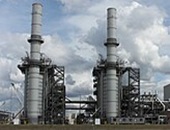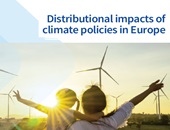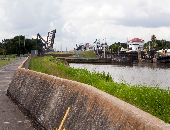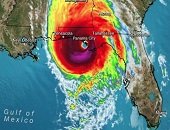Energy transitions
As the low-carbon energy transition takes hold, transition risk becomes a hot topic. Various uncertainties, mismatches, and potential obstacles emerge, threatening to delay the changeover. For example, in 2021, the U.K. had to restart coal-fired power plants due to low wind power. Two major transitions in electricity generation are underway. The cost of generating electricity with natural gas has dropped—and the costs of solar panels and energy storage have also dropped. Both are leading to new vistas in power generation. However, “over-investment in CCNG may affect the transition to renewables,” said Gautam Gowisankaram, professor of economics at Columbia University and […]
Distributional consequences
Climate change marches on. To prepare for worse storms, droughts, and wildfires, the infrastructure must be improved. Governments have different ways to handle the costs of adapting to climate change. How will these additional costs be borne? “Transition to a carbon-neutral economy is at the top of the policy agenda around the globe,” said Moritz Kuhn, professor of economics at the University of Mannheim. Private households account for about two-thirds of carbon emissions. “Governments can introduce policies to speed up the adoption of green technologies,” he said, but the heterogeneity of consumption and carbon emissions could present problems. These will […]
Resilience and Development
For developing countries, how will climate change affect the progress of their economic development? Will these countries be able to use available opportunities through institutions such as the World Bank to adapt to changing conditions and improve people’s lives? “Development and resilience are mutually reinforcing,” said Stéphane Hallegatte, Senior Climate Change Adviser at the World Bank. “Development contributes to resilience, and resilience is crucial for safeguarding gains from increasingly frequent crises.” He was speaking at a webinar on September 5, 2024, on economic development in a changing climate. This was part of the series of talks sponsored by the Federal Reserve Bank […]
On the Move
“Humanity is on the precipice of a great climate migration, and Americans will not be spared,” says Abrahm Lustgarten, the author of a new book released March 26, 2024. “Tens of millions of people are likely to be driven from the places they call home. Poorer communities will be left behind, while growth will surge in the cities and regions most attractive to climate refugees. America will be changed utterly.” On the Move: The Overheating Earth and the Uprooting of America by Abrahm Lustgarten is a new book published by Farrar, Straus & Giroux. It is a vivid, journalistic account […]
Flood Economics
When it comes to natural disasters such as flooding, does it make more economic sense to control the flood? Or to sit back, suffer the consequences, and count on insurance? Climate change leads to more frequent and more intense flooding. As these risks intensify, public funds will often be used to protect communities. Recent work done by economists estimates the amount and distribution of benefits from a major form of public flood risk adaptation, flood control levees. A levee is an embankment built to prevent the overflow of a river. The efficiency and equity implications of levees were investigated by […]
World Energy Outlook
On October 24, 2023, the International Energy Agency (IEA) released its annual report, World Energy Outlook (WEO), to an international audience. The agency states that the energy world “remains fragile but has effective ways to improve energy security and tackle emissions.” Agency analysts looked at how close the countries of the world are to meeting the objectives of the Net Zero Emissions by 2050 (NZE) Scenario, which limits global warming to 1.5 °C, a goal signed by many countries and often referred to as the Paris Agreement. [As of March 2021, 194 states and the European Union have signed the […]
The Role of Insurance in Recovery
Climate change is bringing on events, such as hurricanes and wildfires, of greater severity and frequency than ever before. How does insurance help communities rebuild? What economic barriers arise during recovery? Is insurance the best way to provide disaster relief? These are some of the questions tackled by Carolyn Kousky of the Environmental Defense Fund (EDF) in her recent book and research. She is a co-editor of A Blueprint for Coastal Adaptation and author of Understanding Disaster Insurance: New Tools for a More Resilient Future. On October 19, 2023, Carolyn Kousky, Associate VP, Economics and Policy Analysis at EDF, gave a presentation on […]
Carbon Pricing
What is the best way to address climate change? If too much carbon is released in the air, how can emissions be reduced? By regulating corporations or by imposing costs on consumers in the form of a carbon tax? Moreover, even if a solution is found, not all nations, and not all people within nations, will agree on how to tackle the problem. In the words of Professor Barry Rabe, author of Can We Price Carbon? “Compelling ideas from economics do not necessarily suspend the laws of politics.” On May 4, 2023, Jessica Green, professor of political science at University […]
Climate Risk in Africa
Are European governments turning to African energy producers? What is the effect of Russia’s illegal invasion of Ukraine on other parts of the world? Will this threaten Africa’s transition to renewable energy? Is there any way to put the brakes on climate risk? On December 12, 2022, the Climate Action Tracker group held a virtual event, where three experts on climate risk discussed how to accelerate the transition to renewable energy and enhance climate action in Africa, with a focus on climate governance. Fossil gas is not the answer To meet the 1.5°C target of the Paris Agreement, “the global […]
Carbon, Cargo, Covid
As we slide into summer 2022, what are the big factors affecting the markets? Carbon, cargo, Covid. Governments and companies are starting to address the excessive carbon dioxide that is causing climate change. Interruptions of the supply chain, heavily dependent on cargo ships, continue to worsen operational risk. Meanwhile, the global economy is still dealing with the Covid-19 pandemic. On May 2, 2022, Derek Walter, head of the Institutional Asset Management Committee at the CFA Society Toronto, moderated two panelists during a webinar to discuss the underlying drivers of market changes. “We need to separate the short-term from the long-term […]










